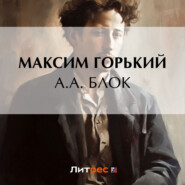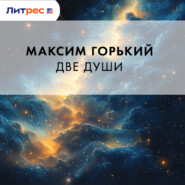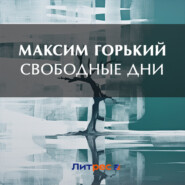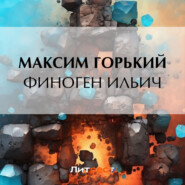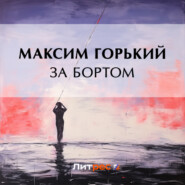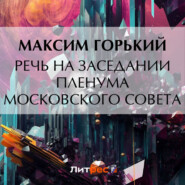По всем вопросам обращайтесь на: info@litportal.ru
(©) 2003-2025.
✖
Mother
Настройки чтения
Размер шрифта
Высота строк
Поля
Behind her the mother heard the trampling noise of those who were running away. Suppressed, excited voices cried:
"Disperse, boys!"
"Vlasov, run!"
"Back, Pavel!"
"Drop the banner, Pavel!" Vyesovshchikov said glumly. "Give it to me! I'll hide it!"
He grabbed the pole with his hand; the flag rocked backward.
"Let go!" thundered Pavel.
Nikolay drew his hand back as if it had been burned. The song died away. Some persons crowded solidly around Pavel; but he cut through to the front. A sudden silence fell.
Around the banner some twenty men were grouped, not more, but they stood firmly. The mother felt drawn to them by awe and by a confused desire to say something to them.
"Take this thing away from him, lieutenant." The even voice of the tall old man was heard. He pointed to the banner. A little officer jumped up to Pavel, snatched at the flag pole, and shouted shrilly:
"Drop it!"
The red flag trembled in the air, moving to the right and to the left, then rose again. The little officer jumped back and sat down. Nikolay darted by the mother, shaking his outstretched fist.
"Seize them!" the old man roared, stamping his feet. A few soldiers jumped to the front, one of them flourishing the butt end of his gun. The banner trembled, dropped, and disappeared in a gray mass of soldiers.
"Oh!" somebody groaned aloud. And the mother yelled like a wild animal. But the clear voice of Pavel answered her from out of the crowd of soldiers:
"Good-by, mother! Good-by, dear!"
"He's alive! He remembered!" were the two strokes at the mother's heart.
"Good-by, mother dear!" came from Andrey.
Waving her hands, she raised herself on tiptoe, and tried to see them. There was the round face of Andrey above the soldiers' heads. He was smiling and bowing to her.
"Oh, my dear ones! Andriusha! Pasha!" she shouted.
"Good-by, comrades!" they called from among the soldiers.
A broken, manifold echo responded to them. It resounded from the windows and the roofs.
The mother felt some one pushing her breast. Through the mist in her eyes she saw the little officer. His face was red and strained, and he was shouting to her:
"Clear out of here, old woman!"
She looked down on him, and at his feet saw the flag pole broken in two parts, a piece of red cloth on one of them. She bent down and picked it up. The officer snatched it out of her hands, threw it aside, and shouted again, stamping his feet:
"Clear out of here, I tell you!"
A song sprang up and floated from among the soldiers:
"Arise, awake, you workingmen!"
Everything was whirling, rocking, trembling. A thick, alarming noise, resembling the dull hum of telegraph wires, filled the air. The officer jumped back, screaming angrily:
"Stop the singing, Sergeant Kraynov!"
The mother staggered to the fragment of the pole, which he had thrown down, and picked it up again.
"Gag them!"
The song became confused, trembled, expired. Somebody took the mother by the shoulders, turned her around, and shoved her from the back.
"Go, go! Clear the street!" shouted the officer.
About ten paces from her, the mother again saw a thick crowd of people. They were howling, grumbling, whistling, as they backed down the street. The yards were drawing in a number of them.
"Go, you devil!" a young soldier with a big mustache shouted right into the mother's ear. He brushed against her and shoved her onto the sidewalk. She moved away, leaning on the flag pole. She went quickly and lightly, but her legs bent under her. In order not to fall she clung to walls and fences. People in front were falling back alongside of her, and behind her were soldiers, shouting: "Go, go!"
The soldiers got ahead of her; she stopped and looked around. Down the end of the street she saw them again scattered in a thin chain, blocking the entrance to the square, which was empty. Farther down were more gray figures slowly moving against the people. She wanted to go back; but uncalculatingly went forward again, and came to a narrow, empty by-street into which she turned. She stopped again. She sighed painfully, and listened. Somewhere ahead she heard the hum of voices. Leaning on the pole she resumed her walk. Her eyebrows moved up and down, and she suddenly broke into a sweat; her lips quivered; she waved her hands, and certain words flashed up in her heart like sparks, kindling in her a strong, stubborn desire to speak them, to shout them.
The by-street turned abruptly to the left; and around the corner the mother saw a large, dense crowd of people. Somebody's voice was speaking loudly and firmly:
"They don't go to meet the bayonets from sheer audacity. Remember that!"
"Just look at them. Soldiers advance against them, and they stand before them without fear. Y-yes!"
"Think of Pasha Vlasov!"
"And how about the Little Russian?"
"Hands behind his back and smiling, the devil!"
"My dear ones! My people!" the mother shouted, pushing into the crowd. They cleared the way for her respectfully. Somebody laughed:
"Look at her with the flag in her hand!"
"Shut up!" said another man sternly.
The mother with a broad sweep of her arms cried out:
"Listen for the sake of Christ! You are all dear people, you are all good people. Open up your hearts. Look around without fear, without terror. Our children are going into the world. Our children are going, our blood is going for the truth; with honesty in their hearts they open the gates of the new road – a straight, wide road for all. For all of you, for the sake of your young ones, they have devoted themselves to the sacred cause. They seek the sun of new days that shall always be bright. They want another life, the life of truth and justice, of goodness for all."
Her heart was rent asunder, her breast contracted, her throat was hot and dry. Deep inside of her, words were being born, words of a great, all-embracing love. They burned her tongue, moving it more powerfully and more freely. She saw that the people were listening to her words. All were silent. She felt that they were thinking as they surrounded her closely; and the desire grew in her, now a clear desire, to drive these people to follow her son, to follow Andrey, to follow all those who had fallen into the soldiers' hands, all those who were left entirely alone, all those who were abandoned. Looking at the sullen, attentive faces around her, she resumed with soft force:
"Our children are going in the world toward happiness. They went for the sake of all, and for Christ's truth – against all with which our malicious, false, avaricious ones have captured, tied, and crushed us. My dear ones – why it is for you that our young blood rose – for all the people, for all the world, for all the workingmen, they went! Then don't go away from them, don't renounce, don't forsake them, don't leave your children on a lonely path – they went just for the purpose of showing you all the path to truth, to take all on that path! Pity yourselves! Love them! Understand the children's hearts. Believe your sons' hearts; they have brought forth the truth; it burns in them; they perish for it. Believe them!"
Her voice broke down, she staggered, her strength gone. Somebody seized her under the arms.
"Disperse, boys!"
"Vlasov, run!"
"Back, Pavel!"
"Drop the banner, Pavel!" Vyesovshchikov said glumly. "Give it to me! I'll hide it!"
He grabbed the pole with his hand; the flag rocked backward.
"Let go!" thundered Pavel.
Nikolay drew his hand back as if it had been burned. The song died away. Some persons crowded solidly around Pavel; but he cut through to the front. A sudden silence fell.
Around the banner some twenty men were grouped, not more, but they stood firmly. The mother felt drawn to them by awe and by a confused desire to say something to them.
"Take this thing away from him, lieutenant." The even voice of the tall old man was heard. He pointed to the banner. A little officer jumped up to Pavel, snatched at the flag pole, and shouted shrilly:
"Drop it!"
The red flag trembled in the air, moving to the right and to the left, then rose again. The little officer jumped back and sat down. Nikolay darted by the mother, shaking his outstretched fist.
"Seize them!" the old man roared, stamping his feet. A few soldiers jumped to the front, one of them flourishing the butt end of his gun. The banner trembled, dropped, and disappeared in a gray mass of soldiers.
"Oh!" somebody groaned aloud. And the mother yelled like a wild animal. But the clear voice of Pavel answered her from out of the crowd of soldiers:
"Good-by, mother! Good-by, dear!"
"He's alive! He remembered!" were the two strokes at the mother's heart.
"Good-by, mother dear!" came from Andrey.
Waving her hands, she raised herself on tiptoe, and tried to see them. There was the round face of Andrey above the soldiers' heads. He was smiling and bowing to her.
"Oh, my dear ones! Andriusha! Pasha!" she shouted.
"Good-by, comrades!" they called from among the soldiers.
A broken, manifold echo responded to them. It resounded from the windows and the roofs.
The mother felt some one pushing her breast. Through the mist in her eyes she saw the little officer. His face was red and strained, and he was shouting to her:
"Clear out of here, old woman!"
She looked down on him, and at his feet saw the flag pole broken in two parts, a piece of red cloth on one of them. She bent down and picked it up. The officer snatched it out of her hands, threw it aside, and shouted again, stamping his feet:
"Clear out of here, I tell you!"
A song sprang up and floated from among the soldiers:
"Arise, awake, you workingmen!"
Everything was whirling, rocking, trembling. A thick, alarming noise, resembling the dull hum of telegraph wires, filled the air. The officer jumped back, screaming angrily:
"Stop the singing, Sergeant Kraynov!"
The mother staggered to the fragment of the pole, which he had thrown down, and picked it up again.
"Gag them!"
The song became confused, trembled, expired. Somebody took the mother by the shoulders, turned her around, and shoved her from the back.
"Go, go! Clear the street!" shouted the officer.
About ten paces from her, the mother again saw a thick crowd of people. They were howling, grumbling, whistling, as they backed down the street. The yards were drawing in a number of them.
"Go, you devil!" a young soldier with a big mustache shouted right into the mother's ear. He brushed against her and shoved her onto the sidewalk. She moved away, leaning on the flag pole. She went quickly and lightly, but her legs bent under her. In order not to fall she clung to walls and fences. People in front were falling back alongside of her, and behind her were soldiers, shouting: "Go, go!"
The soldiers got ahead of her; she stopped and looked around. Down the end of the street she saw them again scattered in a thin chain, blocking the entrance to the square, which was empty. Farther down were more gray figures slowly moving against the people. She wanted to go back; but uncalculatingly went forward again, and came to a narrow, empty by-street into which she turned. She stopped again. She sighed painfully, and listened. Somewhere ahead she heard the hum of voices. Leaning on the pole she resumed her walk. Her eyebrows moved up and down, and she suddenly broke into a sweat; her lips quivered; she waved her hands, and certain words flashed up in her heart like sparks, kindling in her a strong, stubborn desire to speak them, to shout them.
The by-street turned abruptly to the left; and around the corner the mother saw a large, dense crowd of people. Somebody's voice was speaking loudly and firmly:
"They don't go to meet the bayonets from sheer audacity. Remember that!"
"Just look at them. Soldiers advance against them, and they stand before them without fear. Y-yes!"
"Think of Pasha Vlasov!"
"And how about the Little Russian?"
"Hands behind his back and smiling, the devil!"
"My dear ones! My people!" the mother shouted, pushing into the crowd. They cleared the way for her respectfully. Somebody laughed:
"Look at her with the flag in her hand!"
"Shut up!" said another man sternly.
The mother with a broad sweep of her arms cried out:
"Listen for the sake of Christ! You are all dear people, you are all good people. Open up your hearts. Look around without fear, without terror. Our children are going into the world. Our children are going, our blood is going for the truth; with honesty in their hearts they open the gates of the new road – a straight, wide road for all. For all of you, for the sake of your young ones, they have devoted themselves to the sacred cause. They seek the sun of new days that shall always be bright. They want another life, the life of truth and justice, of goodness for all."
Her heart was rent asunder, her breast contracted, her throat was hot and dry. Deep inside of her, words were being born, words of a great, all-embracing love. They burned her tongue, moving it more powerfully and more freely. She saw that the people were listening to her words. All were silent. She felt that they were thinking as they surrounded her closely; and the desire grew in her, now a clear desire, to drive these people to follow her son, to follow Andrey, to follow all those who had fallen into the soldiers' hands, all those who were left entirely alone, all those who were abandoned. Looking at the sullen, attentive faces around her, she resumed with soft force:
"Our children are going in the world toward happiness. They went for the sake of all, and for Christ's truth – against all with which our malicious, false, avaricious ones have captured, tied, and crushed us. My dear ones – why it is for you that our young blood rose – for all the people, for all the world, for all the workingmen, they went! Then don't go away from them, don't renounce, don't forsake them, don't leave your children on a lonely path – they went just for the purpose of showing you all the path to truth, to take all on that path! Pity yourselves! Love them! Understand the children's hearts. Believe your sons' hearts; they have brought forth the truth; it burns in them; they perish for it. Believe them!"
Her voice broke down, she staggered, her strength gone. Somebody seized her under the arms.












